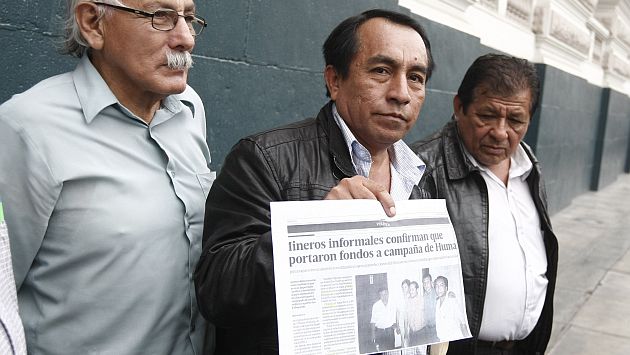A leader of Peru’s informal mining sector has claimed that President Ollanta Humala accepted campaign funding in the run-up to the 2011 elections, raising questions over the head of state’s ties to the illicit mining industry.
In an interview with Peru 21, Victor Chanduvi, the head of the Peruvian Miners’ Center (Central de Mineros de Peru), said that informal miners contributed over $1 million to Humala’s campaign — along with pure gold. Following similar claims in June, Humala denied taking money from the informal mining sector and said that all campaign contributions had been declared to electoral authorities.
Chanduvi claimed that he and other informal miners held over one hundred meetings with Humala, his wife and other officials between 2008 and 2010, in which they discussed formalizing the sector.
Chanduvi also said that when Interior Minister Daniel Urresti served as high commissioner against illegal mining, he used to charge extortion fees to informal miners operating in the Madre de Dios region. Urresti has responded by accusing Chanduvi of slander.
The mining leader said that he was coming forward with his claims now — three years after the elections — because Humala had failed to uphold his end of the deal by working to formalize the mining sector. Furthermore, he claimed that Humala received campaign money from the Picon family, who are being investigated for laundering drug money.
InSight Crime Analysis
Peru’s illegal mining industry is estimated to be worth between $500 million and $3 billion annually. There are many different types of actors within this industry, ranging from small-scale miners who lack formal permits for land they have been mining for years, to large-scale criminal operations. It is crucial for the government to balance the dismantling of mafia-run mining operations, without criminalizing all informal miners.
The government passed a law in April banning all unregulated mining — while making provisions for over 50,000 small mining operations to apply for permits — and has made the industry a focal point of operations by the Peruvian security forces. However, indiscriminately blowing up mining infrastructure does not necessarily mean authorities are tackling the criminal side of the business: tracking dirty money, or investigating the mafia groups thought to run gold mining in some regions.
SEE ALSO: Coverage of Mining
This is not the first time Humala has faced allegations of ties to illicit money — prior to his 2011 win, evidence came to light linking him and his party to drug funds. Nor is Humala the only president who has been linked to illegal industries in Peru, a country deeply affected by corruption at all levels of government.
Illegal gold mining, which causes massive environmental damage and is often tied to human trafficking, is just one of the illicit extraction industries Peru must deal with. Another natural resource — timber — is also a major problem. The government recently created a commission to address wood trafficking, after four indigenous activists who opposed the trade were killed.

